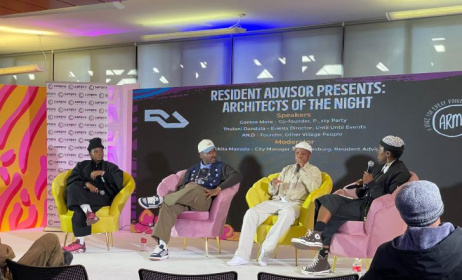Burkina Faso: Private copying levy takes centre stage at REMA music conference
Intellectual property experts, cultural practitioners and artists convened in Ouagadougou, Burkina Faso, to discuss the importance of creators’ remuneration from private copying levies during Les Rencontres Musicales Africaines (REMA), or ‘African Musical Meetings’, from 14 to 16 October.
 REMA founder Alif Naaba. Photos: Seydou Kone
REMA founder Alif Naaba. Photos: Seydou Kone Zidass at REMA 2021.
Zidass at REMA 2021. Burkinabe couple Att and Sissao at REMA 2021.
Burkinabe couple Att and Sissao at REMA 2021. Speakers at this year's edition.
Speakers at this year's edition. Didier Awadi speaking at the conference.
Didier Awadi speaking at the conference.
REMA is organised by Cour du Naaba, a cultural organisation founded by musician Alif Naaba, who during the opening ceremony said the primary purpose of the topic was to develop the scope of private copying for the benefit of creators. “We hope to discover better frameworks to compensate creators in the West African Economic and Monetary Union [UEMOA] region for widespread copying of their works for private or domestic use,” he said.
Burkinabe Minister of Culture, Arts and Tourism Elise Foniyama Thiombioano Ilboudo, Minister of Energy Bachir Ismael Ouédraogo and Minister of Commerce Harouna Kaboré lauded the REMA event and pledged to support all initiatives geared towards better remuneration for creatives.
The opening ceremony also saw Senegalese rapper Didier Awadi and the organisers of Amani Festival in the DRC receive lifetime achievement awards for their contributions to the music industry. Awadi also delivered a keynote address alongside Burkinabe singer Amzy.
Naaba told Music In Africa: “Getting these kinds of insights from people who have ascended the upper echelons of the music industry is priceless. We can’t thank them enough for spending time, answering questions and sharing their expertise with the audience.”
The conference hosted two panel discussion in line with this year’s theme, namely A Shared Knowledge of Private Copying and Towards an Action Plan for the Harmonisation of Remuneration Systems for Private Copying in the UEMOA Zone. They were moderated by Movement of Creatives Africa (MOCA) director Alain Bidjeck.
The speakers included Awadi, Burkina Faso Copyright Office (BBDA) general manager Samuel Garane, Ivorian musician and arranger David Tayorault, Burkinabe singer Dez Altino, International Confederation of Societies of Authors and Composers (CISAC) regional director Samuel Sangwa, Senegalese Copyright and Related Rights Office (SODAV) director Aly Bathily and Cour du Naaba label administrator Philippe Chaudoir.
The speakers assessed the challenges of private copying in the region and emphasised the need for collaboration between collective management organisations (CMOs), copyright offices and policymakers. During the conference, Burkina Faso was the only participating country collecting private copying levies in the region. However, on 24 October, the Ivorian government signed a decree implementing private copying in the country. In Senegal, the legislation is there but collection has not begun yet.
The panellists were unified in their assessment that private copying is an underused driver of economies, especially in the current digital environment, and agreed that government support would go a long way in implementing private copying collections. Garane shared BBDA’s experience in collecting and distributing private copying levies and said the organisation was open to offering technical assistance to those interested in adopting a framework for private copying.
Sangwa presented CISAC’s latest Private Copying Global Study, which provides an overview of private copying systems and the legal environment. He spoke about the legal and enforcement measures needed to maximise income for rights holders and illistrated the potential economic benefits of effectively implementing levies to cover digital devices.
Awadi said telecommunication companies and international broadcasters needed to be regulated to empower local creatives. He said the promise of added sources of revenues had enticed musicians to collaborate with mobile service providers, broadcasters, digital content firms and mobile hardware manufacturers, but musicians ultimately had limited bargaining power that left them vulnerable as had been the case for decades.
On issues of copyright, the panellists agreed on the need for proper structures to ensure fair remuneration and quick action on infringement cases, especially those involving telcos.
A workshop on the digital enhancement of traditional heritage facilitated by Bidjeck was held at Goethe-Institut as part of the REMA programme. Naaba said the workshop highlighted the importance of cultural heritage for urban regeneration. “There is a need to expand and further support the application of digital tools to preserve cultural heritage and to make it widely accessible. The relation between cultural heritage and its digitised format through the experience of audiences is of particular interest to REMA,” he said.
The workshop saw the participation of traditional musicians, startups and music producers, and it resulted in a proposal of a digital library project for traditional music, which REMA will incubate. “The workshop was the first step of a new incubation programme developed by REMA,” Bidjeck said. “The goal is to have a platform where the country’s traditional music can be accessed and sampled. It was proposed that veteran traditional musician and music teacher Zidass be the project’s patron due to his knowledge of traditional music.”
REMA also hosted music showcases at the Foyer du Renouveau venue with artists from Burkina Faso, Senegal, Ivory Coast and France. Highlights included Zidass (Burkina Faso), Att & Sissao (Burkina Faso), Spyrow (Ivory Coast), Mahamoud Ilboudo (Burkina Faso) and Didier Awadi (Senegal).
REMA 2021 also paid tribute to former Burkinabe president and revolutionary hero Thomas Sankara.



























Comments
Log in or register to post comments